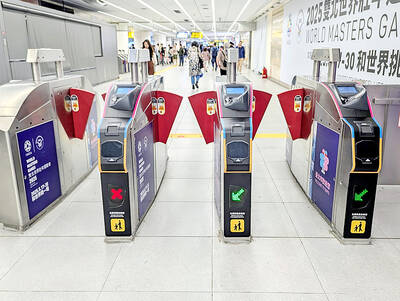The average ages at which Taiwanese women get married and have children for the first time have increased over the past decade, statistics compiled by the Ministry of the Interior show.
The median age for women entering into their first marriage last year increased to 30.03, up from 28.06 in 2007, the data showed.
The average age of women giving birth to their first child last year rose to 30.83, an increase of 0.09 years from 2016, but an increase of 2.29 years from 2007.
Women in the 30-to-34 age group accounted for 36.73 percent of first-time births last year, followed by women in the 25-to-29 age group at 28.54 percent and the 35-to-39 age group at 18.33 percent, the statistics showed.
The national median age at which women give birth was 31.97 last year, up 0.12 years from 2016 and an increase of 2.44 years over the past decade, the statistics showed.
Women giving birth at or over the age of 35 accounted for 29.04 percent of all births last year, with 37.02 percent of them giving birth to their first baby and 44.1 percent to their second, an increase of 3.97 and 0.9 percentage points, respectively, from 2007.
Mothers aged 35 or older who gave birth to their third child or more accounted for 18.89 percent of births, down by 4.87 percentage points over the past decade, the data showed.
The rate of first-time mothers younger than 30 has declined over the past decade, but the rate for those aged 35 and over had increased from 7.76 percent of the total in 2007 to 21.27 percent last year.
The statistics also show that aside from 2010, when the number of births hit a record low of 166,886, the average number of births over the past 10 years was more than 190,000, although last year, 194,616 births were recorded, which was 6.3 percent less than in 2016.
The number of births rose to 196,627 in 2011 and again to 229,481 in 2012, before falling back to 199,113 in 2013 and recovering to 210,383 in 2014, the statistics showed.
Taiwan has one of the lowest birth rates in the world.
The National Development Council expects Taiwan to become a super-aged society — defined as 20 percent of the population being 65 or older — by 2025.

A magnitude 6.4 earthquake struck off the coast of Hualien County in eastern Taiwan at 7pm yesterday, the Central Weather Administration (CWA) said. The epicenter of the temblor was at sea, about 69.9km south of Hualien County Hall, at a depth of 30.9km, it said. There were no immediate reports of damage resulting from the quake. The earthquake’s intensity, which gauges the actual effect of a temblor, was highest in Taitung County’s Changbin Township (長濱), where it measured 5 on Taiwan’s seven-tier intensity scale. The quake also measured an intensity of 4 in Hualien, Nantou, Chiayi, Yunlin, Changhua and Miaoli counties, as well as

Credit departments of farmers’ and fishers’ associations blocked a total of more than NT$180 million (US$6.01 million) from being lost to scams last year, National Police Agency (NPA) data showed. The Agricultural Finance Agency (AFA) said last week that staff of farmers’ and fishers’ associations’ credit departments are required to implement fraud prevention measures when they serve clients at the counter. They would ask clients about personal financial management activities whenever they suspect there might be a fraud situation, and would immediately report the incident to local authorities, which would send police officers to the site to help, it said. NPA data showed

ENERGY RESILIENCE: Although Alaska is open for investments, Taiwan is sourcing its gas from the Middle East, and the sea routes carry risks, Ho Cheng-hui said US government officials’ high-profile reception of a Taiwanese representative at the Alaska Sustainable Energy Conference indicated the emergence of an Indo-Pacific energy resilience alliance, an academic said. Presidential Office Secretary-General Pan Men-an (潘孟安) attended the conference in Alaska on Thursday last week at the invitation of the US government. Pan visited oil and gas facilities with senior US officials, including US Secretary of the Interior Doug Burgum, US Secretary of Energy Chris Wright, Alaska Governor Mike Dunleavy and US Senator Daniel Sullivan. Pan attending the conference on behalf of President William Lai (賴清德) shows a significant elevation in diplomatic representation,

The Taipei MRT is to begin accepting mobile payment services in the fall, Taipei Rapid Transit Corp said on Saturday. When the company finishes the installation of new payment units at ticketing gates in October, MRT passengers can use credit cards, Apple Pay, Google Pay and Samsung Pay, the operator said. In addition, the MRT would also provide QR payment codes — which would be compatible with Line Pay, Jkopay, iPass Money, PXPay Plus, EasyWallet, iCash Pay, Taiwan Pay and Taishin Pay — to access the railway system. Currently, passengers can access the Taipei MRT by buying a single-journey token or using EasyCard,